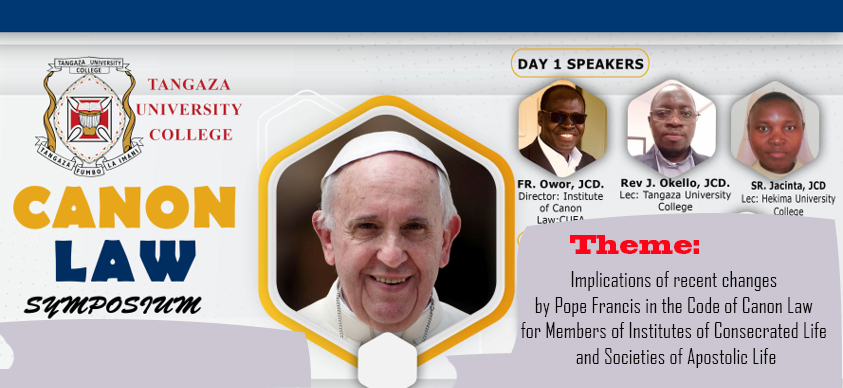KENYA: At a Symposium Focusing Changes in Canon Law, Consecrated Persons Enlightened on the Implications

Sr. Jecinter Antoinette Okoth, FSSA
At a symposium to expound on the recent changes modified in the Code of Canon Law by Pope Francis, consecrated persons have been enlightened on the consequences if the changes are not implemented.
Speaking to hundreds of participants from various Congregations and Societies Thursday, February 17, Sr. Jacinta Auma Opondo a Canonist and lecturer at a Kenya-based Institute of higher learning; Hekima University College, acknowledged that some specific issues have challenged the Church since the revised Code of Canon Law was promulgated in 1983, hence the need made necessary.
“Changes in the canonical provisions promulgated by Pope Francis are expected to help the Church safeguard against abuse… and his strong exhortation is to take seriously the notion that punishment can be an important part of good leadership,” Sr. Opondo underscored.
Referencing Pope’s intention on the moderations she said, “There was an obvious need to revise the penal legislation because of rapid social changes. Indeed, it is love that requires that shepherds apply the penal system whenever required, observing the three purposes that make it necessary, namely restoring the needs of justice, correcting the offender, and the elimination of annoyances.”
Focusing on the amendment of canon 579 of the code of Canon Law which stated earlier that “Diocesan bishops, each in his own territory, can erect institutes of Consecrated life by formal decree, provided that the Apostolic See has been consulted,” Sr. Opondo FSSA disclosed that the modification made in November 2020 highlights that “Diocesan bishops, each in his own territory, can erect institutes of Consecrated Life by formal decree, with prior permission in writing from the Apostolic See.”
Based on this modification, can. 579 therefore require bishops to consult closely with the Apostolic See which Sr Opondo says, “Prior consultation with the Holy See is to be understood as necessary ad validitatem before establishing a diocesan Institute of Consecrated life, otherwise risking nullity of the decree of establishment of this said Institute.”
This, she narrated, “implies that the autonomy of the bishops has decreased and there is a centralization of this competence in favour of Apostolic See,” hence, “bishops will not be able to erect an institute of consecrated life of diocesan right until they have “the prior written authorization of the Apostolic See.”
In the Thursday symposium themed: “Implications of recent changes by Pope Francis in the Code of Canon Law for Members of Institutes of Consecrated Life and Societies of Apostolic Life,” Sr. Opondo disclosed further the modification of Canon 1376 of book V on administration of temporal goods.
She further narrated that “little was expressed in the Code in terms of penalties relating to mismanagement” of temporal goods which should be used “to care for the decent support of members of religious institute and to meet the needs of Charism in exercising works of apostolate and charity.”
According to Sr Opondo, there was “Only one canon (1377) specifically related to temporal goods and prescribed a “just penalty” for anyone transferring ecclesiastical goods without the required permission.”
Given the extent and monetary value of ecclesiastical goods at local, diocesan and universal levels, and given recent scandals—allegations of embezzlement and misappropriation of funds, money laundering, hidden off-balance-sheet funds and real estate sold for less than market value,” Sr Opondo said, while addressing the Consecrated persons, “the Code has been revised to include a new canon (can. 1376) to deal with those who steal, misuse ecclesiastical goods and who have shown grave negligence in their administration.”
“The revised canon makes clear the penalties that will be imposed on those who administer or transfer ecclesiastical goods “without the prescribed consultation, consent, or permission, or without another requirement imposed by law for validity or for lawfulness.”
Emphasising the value of penalties during the Thursday symposium, Fr. John Okello a member of the Consolata Missionaries (IMC) disclosed that “All penalties must take into account, as their ultimate objective, the eternal salvation of the offender, his or her spiritual conversion on earth…reparation of scandal, restoration of justice and reform of the offender.”
The cleric reference canon 1317, saying that the “church has the innate and proper right to coerce offending Catholics with penal sanctions (and) the right should be exercised with appropriate restraint,” knowing that “Inflicting of penalties is not the primary or fundamental purpose of the church.”
The two-day symposium was convened by the department of Canon Law, School of Theology in Tangaza University College, a constituent of the Catholic University of Eastern Africa (CUEA) with the intention to enlighten members of institutes of Consecrated life and societies of Apostolic life to understand the modifications in the Code of Canon Law.


